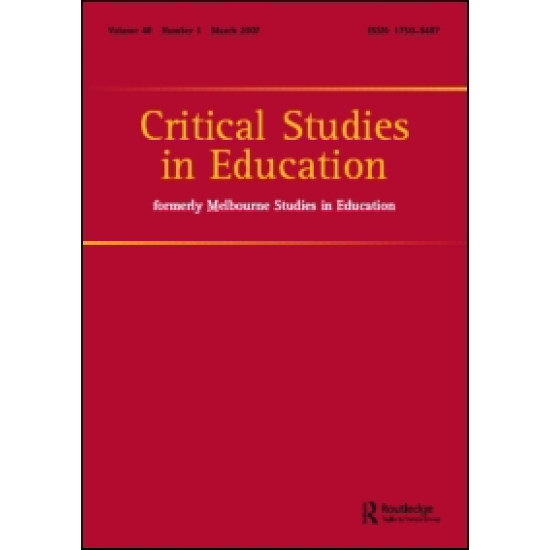
2017 Impact Factor: 2.080
Ranking: 51/238 (Education & Educational Research)
© 2018 Thomson Reuters, 2017 Journal Citation Reports®
2017 CiteScore 1.62 - values from Scopus
Critical Studies in Education
Aims and Scope
Critical Studies in Education is one of the few international journals devoted to a critical sociology of education, although it welcomes submissions with a critical stance that draw on other disciplines (e.g. philosophy, social geography, history) in order to understand 'the social'.
Two interests frame the journal’s critical approach to research: (1) who benefits (and who does not) from current and historical social arrangements in education and, (2) from the standpoint of the least advantaged, what can be done about inequitable arrangements. Informed by this approach, articles published in the journal draw on post-structural, feminist, postcolonial and other critical orientations to critique education systems and to identify alternatives for education policy, practice and research.
CSE also subscribes to a critical ontology and epistemology. It rejects the positivist view that social reality is 'out there' waiting to be 'found' and that researchers are able to maintain an objective distance from research subjects. Instead, the journal takes the view that researchers generate data rather than find them and that the representation of data is a form of analysis. For these reasons, we do not publish articles that separate 'findings' from 'discussion', whether they have discrete sections named in this way or not.
Submission Requirements and Review Process
The journal welcomes submissions of the highest quality and importance, which make original theoretical or theorised empirical contributions, and are aimed at moving the field forward. Articles that employ traditional and/or innovative methods of research are equally accepted. Empirical data can be represented in qualitative and/or quantitative forms.
Submissions may be focused on education policy and/or practice (including pedagogy) across formal education contexts (e.g. schooling, vocational and further education, higher education) as well as informal settings (e.g. television, communities, social media). They typically focus on power relations associated with gender, class, poverty, race, ethnicity and the reproduction or disruption of disadvantage through educational processes.
Critical Studies in Education is a double-blind peer-reviewed journal. The submissions and review process is managed online using ScholarOne. Submissions undergo rigorous peer review, based on initial editor screening and anonymized review by at least two experts in the field. Reviewers make recommendations to the journal's editors who make the final decision about publication. The editors also reserve the right to reject manuscripts outright (i.e. without sending them to review) when these are demonstrably not of an appropriate quality or standard and/or when they do not meet the above aims, scope and submission requirements.
Disclaimer:
Taylor & Francis makes every effort to ensure the accuracy of all the information (the “Content”) contained in its publications. However, Taylor & Francis and its agents and licensors make no representations or warranties whatsoever as to the accuracy, completeness or suitability for any purpose of the Content and disclaim all such representations and warranties whether express or implied to the maximum extent permitted by law. Any views expressed in this publication are the views of the authors and are not the views of Taylor & Francis.

















